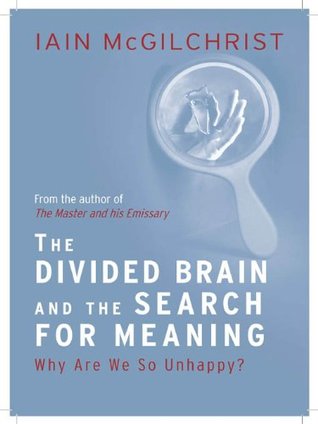More on this book
Community
Kindle Notes & Highlights
What are the key distinctions? One way of looking at the difference would be to say that while the left hemisphere's raison d'être is to narrow things down to a certainty, the right hemisphere's is to open them up into possibility. In life we need both. In fact for practical purposes, narrowing things down to a certainty, so that we can grasp them, is more helpful. But it is also illusory, since certainty itself is an illusion – albeit, as I say, a useful one. There is no certainty. The more closely one pins down one measure (such as the position of a particle), the less precise another
...more
Although ‘seeing clearly’ is an image of grasping the truth, there is no such thing. At what level of magnification, at what level of description can you be said to have seen something clearly? Is a book seen clearly when it is seen as a whole in your hand, or when you read it, or when you take a magnifying glass to the paper and see the hills and dales of the paper, or when you go further and see the filamentous threads of which the paper is composed, or under electron microscopy, or when it finally resolves into probabilities of the presence of subatomic particles, and reveals itself to be
...more
An important consequence of this narrow-focus attention, aiming for certainty, is that it renders everything explicit. Just as a joke is robbed of power when it has to be explained, metaphors and symbols lose their power when rendered explicit. And metaphor is not a decorative turn, applied on top of the serious business of language in order to entertain: all thinking, most obviously philosophical and scientific thinking, is at bottom metaphorical in nature, though we are so familiar with the metaphors that we don't notice their existence.
the purpose of the left hemisphere is to allow us to manipulate the world, not to understand it.
The left hemisphere is not in touch with reality but with its representation of reality, which turns out to be a remarkably self-enclosed, self-referring system of tokens.
Reason is, after all, a complex concept. Some kinds of rationality can be unreasonable. Rationality, the schematic carrying out of algorithmic procedures in the way that a machine would, is better done by the left hemisphere, it is true. But other kinds of reason, including the reason that tells you the limits of reason, depends on the right hemisphere.
the left hemisphere sees truth as internal coherence of the system, not correspondence with the reality we experience.
As Kant memorably put it, concepts without intuitions are empty, intuitions without concepts are blind. We need the contributions of both, but for different purposes. An uncritical following of intuition can lead us astray, but so can an uncritical following of logic.
In the world of research, we now have to be able to say in advance what we are going to find, and no one will fund a project unless it looks like having a chance of turning up a ‘positive’ finding, which in reality means that it must be something pretty close to what we already know. We are not prepared to trust; we feel we must micro-control. The aim is to increase efficiency by avoiding what are conceptualised as waste or error, but it assures only one thing: mediocrity. Sadly many of those doing the most interesting work in any field are increasingly having to do so outside the mainstream.
...more


